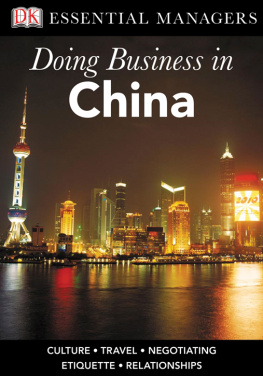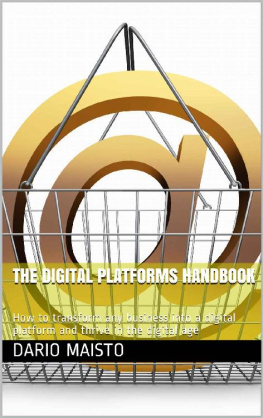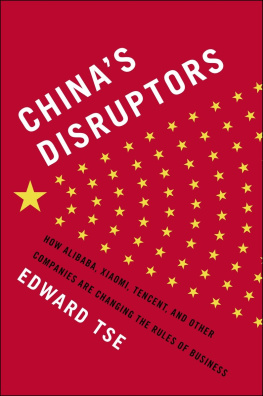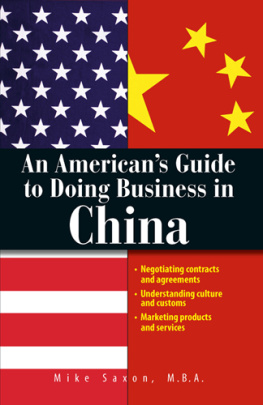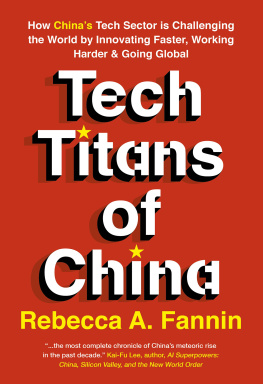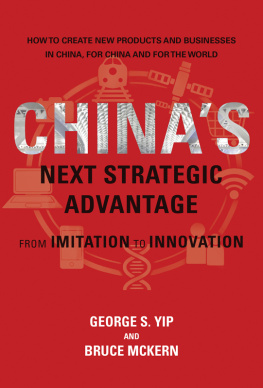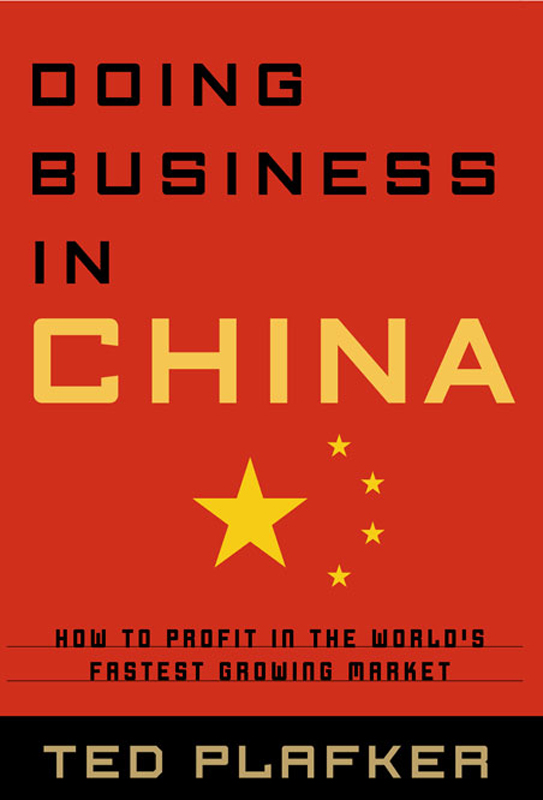Copyright 2007 by Ted Plafker
All rights reserved. Except as permitted under the US Copyright Act of 1976, no part of this publication may be reproduced, distributed, or transmitted in any form or by any means, or stored in a database or retrieval system, without the prior written permission of the publisher.
Warner Business Books
Hachette Book Group
237 Park Avenue
New York, NY 10017
Visit our website at www.HachetteBookGroup.com.
The Warner Business Books name and logo are trademarks of Hachette Book Group, Inc.
First eBook Edition: October 2007
ISBN: 978-0-7595-6959-1
For Benjamin, Daniel, and Jonathan: Beijings youngest old China hands.
And for Roberta, of course, who knows more than I ever willabout doing business in China, and about anything else that matters.
How This Book Helps You Identify and Pursue the Top Business Opportunities in Chinas Emerging Market
S o...youre thinking of doing business in China. For years now, youve been reading all the hype about Chinas rapid growth, its voracious appetite for investment, technology, commodities, goods, and services. Youve been hearing one breathless account after another about Chinese industrys steady rise up the value chain, and its steady march into global markets. The dragon is roaring, the giant is awakening, and the world is trembling with awe, just as Napoleon (perhaps apocryphally) predicted two centuries ago. Add it all up, and the conclusion seems inescapable: Any company, whatever its size and whatever its business, simply must get into China.
If youve bothered to pick up this book, there is a fair chance you have already reached that conclusion yourself. But are you right? Do you really need to be in China?
Even if youve already worked this question hard and decided that your answer is yes, you may still have some nagging fears that youre simply falling victim to a herd mentality. Doesnt it seem that everyone these days is joining in a mad rush to China? And isnt it usually better to buck the trend? After all, dont the real winners look to see where the herd is movingthen cut the other way?
Sometimes they do and sometimes, of course, thats the shrewd move. Very often, though, the herd is moving so fast because its on to something big. Clearly, that is the case with the China boom. A look at any indicator you choose, whether its economic growth rates, consumption patterns, trade volumes, or investment figures, is enough to tell you that business in China is big and growing fast.
But size isnt everything, and just because something is big doesnt mean it is right for everyone. Among the most common pitfalls plaguing foreign businesses in China is a tendency to make sweeping generalizations, and this is one youll have to watch out for every step of the waystarting with that very first big decision about whether you really need to be in China at all.
So what are the issues and the factors you need to consider? Yes, China is growing, and yes, China is moving fast. And yes, there probably are great opportunities for your firm to source your goods, sell your products, or promote your services in this fastest growing of markets. But despite all that, the final decision is no slam dunk, and the easy answerYes, we have to be there!is simply not right for everyone.
Given its forbidding business climate, its uniquely complex social, legal, and political environment, and its rampant corruption, China is tough going. Setting up is costly, and progress is usually slow. In many cases, progressnot to mention profitabilityis downright elusive. As many foreign companies have already proven, success in China is possible, but only for those who have the patience, persistence, and resources to see it through. It does not come on the quick, or on the cheap.
In virtually all cases, the companies that have succeeded in China first spent long years laying the groundwork and spending money rather than earning it. The conventional wisdom among some consultants is that China is only right for companies with at least $20 to $30 million in annual sales, and a workforce of at least two hundred employees. Of course, such broad and facile guidelines cannot be right for everyone, and you will need to make your own calculations based on what you yourself know about your company and your industry. But no matter what, this is where you need to start, right here with Item Number One on the list of things you need to know before you take the plunge: If you dont have the time and money to do it right, China is not for you.
With that, you may just decide to close this book right here. But not so fast! Even if you do not plan to do business in China yourself, it is still worth your while to understand what is going on there. Because no matter what business you do, and no matter where you do it, there is a good chance that Chinaon some level, directly or indirectlyis impacting your bottom line. And if it isnt yet, it probably will be soon.
Chinese demand is a key factor driving up global prices on many vital commodities, including oil, copper, coal, iron ore, and others. And strong Chinese supply is keeping the lid on the prices of other commodities, such as magnesium and rare earth metals.
As a major manufacturing and trading hub, China is also reshaping global pricing structures across a huge range of products. In chapter 6, you will see how Chinausing its vast supply of cheap labor, but also other competitive advantagesis undercutting competitors and taking a dominant share in markets worldwide. In many instances, it is competing against American businesses, and winning. Even when that is not the case, China is affecting markets in every part of the world and transforming the playing field of global trade.
So whether you planned on it or not, and whether you realize it yet or not, there is a good chance that what is now happening in China matters to you and your business.
If you are still thinking of doing business in China, if you have done the math and determined that you have the resources necessary to do it well, you are right to be enthusiastic about your prospects. But you also need to keep clearheaded.
The hardened China veterans, the foreigners who have already been on the ground doing business for twenty years or more, are all too familiar with a certain kind of stock character: the wide-eyed first-time visitor from the home office. One of the colorful terms they use to describe such people is China drunk.
They are usually easy to spot. Fresh off the plane from corporate headquarters, they are immediately dazzled by what they see. Their first stop is likely to be the gleaming new airport terminals of either Beijing or Shanghai, followed by a trip into town along a world-class freeway.
Their airport limo is likely as not to be a made-in-China Audi or deluxe Buick sedan, and as it reaches town, it will carry them past huge new buildings and bustling busy streets. The sight of so many restaurants and shops filled with so many well-dressed people will immediately reassure them that this is indeed the place to be.
The limo will then deposit them at a five-star hotel, opulently decorated with marble, dripping with glitz, and full of still more well-dressed locals talking business on their cell phones as they enjoy the high life in the lobby bar.
This kind of scene truly can be intoxicating. But just like the kick of the fiery grain liquor offered at any Chinese banquet, it can sneak up on you and knock you for a loop, leaving you with nothing but a nasty headache, a fuzzy collection of bad memories, and some gut-wrenching questions about where all your money went.



